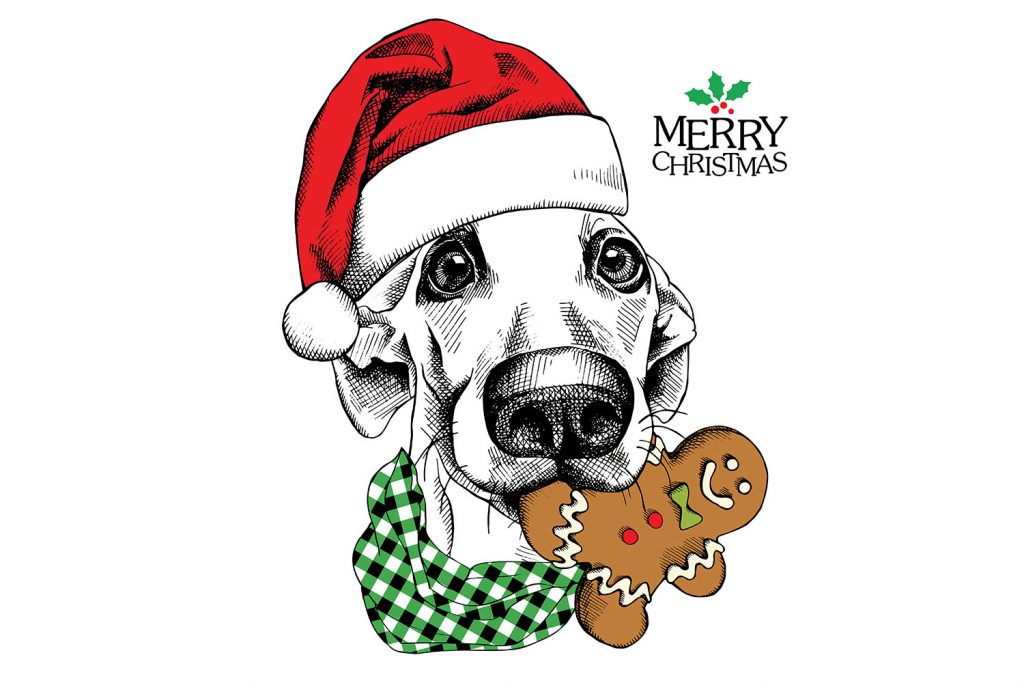Bark! The Hairy Angels Sing: Christmas Safety Tips
01/12/2016
We all know Christmas can be a time of ups and downs. Huge amounts of preparation leading up to a few days of festive fun, hopefully. In amongst all the stress, excitement and joy, it’s easy to overlook our canine companions. Here’s our Christmas safety tips to make sure your dogs have a happy Christmas too.
Peace and Quiet
Even the quietest households are usually busier at Christmas time. More post landing on the doormat, more visitors to the house, more shopping. Your dog will pick up on the increase in activity and will react accordingly. Perhaps they will be more excitable, barking at every ring of the doorbell or fresh delivery from the postman. Or perhaps they will become more anxious, hiding from guests.
Try to keep your normal routine as much as possible, with plenty of walks at the usual time of day. At home, ensure your dog has a safe, quiet place to rest. Ask house guests, particularly children, to leave the dog undisturbed when they are in their quiet spot.
Food
If it’s possible for human diets to go out of the window at Christmas time, it’s also possible for the same to happen to dogs. And with more food in the house, including seasonal treats and leftovers, it’s also easy for dogs to eat something that could make them really poorly. These Christmas safety tips focus on your dog’s diet:
- Feed to condition with their usual Gilbertson & Page dog food at the normal times, offering plenty of fresh water alongside.
- Avoid feeding human food to your dog. If you do want to share a bit of your Christmas dinner, keep to small amounts of meat and vegetables. Avoid onion gravy and remember to avoid poultry bones, which can splinter and severely damage your dog’s stomach and intestinal tract. Put the food in your dog’s feeding bowl to avoid mixed messages about where they are allowed to eat.
- If you’d like to treat your dog, choose a specified dog treat. You can buy them or make them yourself. There are lots of recipes online. It is important to include any treats in your dog’s daily portion of food not as well as it.
- Foods and drinks that are poisonous for dogs include: chocolate, grapes (also currants and raisins), the allium family (onions, garlic, shallots and chives), Macadamia nuts, avocados, blue cheese, caffeine and alcohol. Be careful to avoid foods containing any of these as ingredients, such as mince pies, Christmas cake, pies and party food.
- Cooking for guests and having more food in the house inevitably leads to leftovers. Naturally careful planning to steer clear of food waste is ideal. Not to mention having a well trained dog that sticks to their own food. However, covering any leftovers and keeping them out of the way of your dog is a good idea for households where dogs struggle to resist temptation. Make sure leftovers are used up before they go past their best. Not only does this avoid food waste, but it also prevents dogs from getting poorly by eating off food.
- You can find more information on keeping your dog safe from food risks here.
Accident Prevention
Decorating the house for Christmas is my favourite past time in the run up to the festive period. What could be nicer than bringing the outside in with sprigs of holly, mistletoe and evergreens? And I don’t think I’ll ever tire of the magic of a Christmas tree covered in decorations and fairy lights. These Christmas safety tips look at preventing accidents in the home.
- Keep festive foliage out of your dog’s reach to be on the safe side. Pine needles and holly leaves are too prickly for a dog to eat, whilst other plants such as mistletoe and ivy can cause a mild upset stomach.
- Batteries pose a choking risk as well as more serious complications such as chemical burns and poisoning.
- Dogs can also choke on decorations and ornaments, which have the added risk of causing gastro-intestinal damage.
- It’s certainly fun watching your canine companion cavort around in a sea of wrapping paper, but dog owners need to be wary of them snaffling it on the side. Whilst wrapping paper in small amounts is non-toxic, if eaten in large amounts is can cause a blockage in the guts.
I hope you’ve found our Christmas safety tips useful. Remember, always seek the advice of a vet if your dog eats or drinks something they shouldn’t.
Gilbertson & Page wishes everyone a Very Merry Christmas and a happy New Year.



